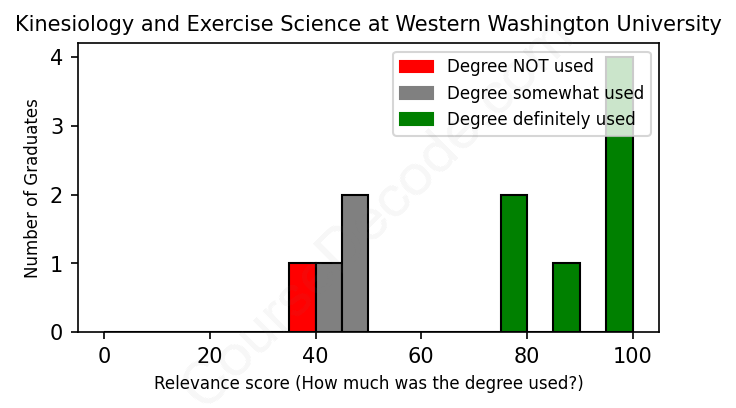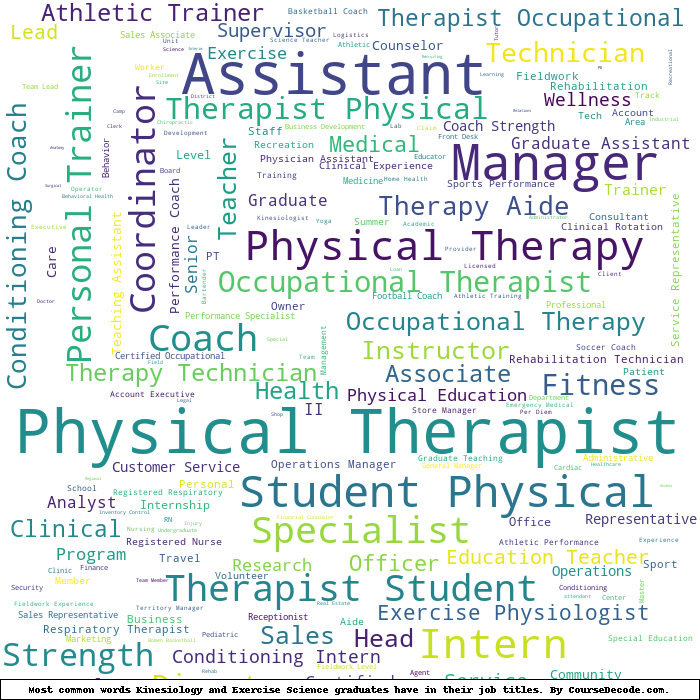
First, some facts. Of the Kinesiology and Exercise Science graduates from Western Washington University we've analyzed , here's how many have used (or NOT used) their degree in their career:

These are estimates based on AI analysis of 11 LinkedIn profiles (see below).
The verdict? Above average. Overall, with an average relevance score of 73%, Kinesiology and Exercise Science graduates from Western Washington University have a higher likelihood (+6%) of finding work in this field compared to the average graduate across all fields:
And for comparison, here's the chart for all profiles we've looked at across all degrees.
Also, after graduating, 81% of these graduates have pursued further education other than another Bachelor's degree (such as a Masters degree or other), compared to the average across all profiles of 35%. This suggests you may need more than just a Bachelors degree to be competitive as a Kinesiology and Exercise Science graduate.
See the details:
|
Relevance score: 39% We think this person has NOT gone into a career related to their degree. We think this person has NOT gone into a career related to their degree.
DEGREE INFOGraduated in 2015 from Western Washington University with a Bachelor's degree in Kinesiology and Exercise Science. No other secondary education since. JOB HISTORY SINCE GRADUATIONBarista THE WOODS COFFEE Aug 2016 - Feb 2017 Flight Attendant  Alaska Airlines Aug 2017 - Present Recruiting Assistant  Aya Healthcare Mar 2023 - Present ABOUTNo information provided. |
The top 10 most common jobs done by the graduates we've analyzed (ranked most common to least) are:
When looking at the job profiles of graduates from Western Washington University who studied Kinesiology and Exercise Science, the most common roles seem to center around personal training and physical therapy. Many have taken on positions such as Personal Trainer at various gyms, where they directly apply the knowledge from their degree in exercise techniques and fitness programming. For those leaning towards rehabilitation, jobs like Physical Therapist and Physical Therapy Aide are prevalent, indicating a strong relevance to Kinesiology and Exercise Science. Others have gotten involved in roles like Wellness Ambassadors and Group Exercise Instructors, which also tie back into promoting health and exercise.
However, not all career paths taken by these graduates stay strictly within the realm of Kinesiology and Exercise Science. Several individuals have ventured into fields such as recruitment, customer service, and even software engineering, which don’t utilize their specialized knowledge of human movement and health. Overall, while many graduates have found positions that are highly relevant to their degree, there's a significant number who have drifted into roles that bear little relation to the Kinesiology and Exercise Science expertise they gained at university. It's a mixed bag, really—those who stick to fitness and rehabilitation certainly benefit from their education, but others seem to take a different route entirely.
Here is a visual representation of the most common words in job titles for Kinesiology and Exercise Science graduates (this is across all Kinesiology and Exercise Science graduates we've analyzed, not just those who went to Western Washington University):

The career trajectories for graduates from Western Washington University's Kinesiology and Exercise Science program show a mixed bag, but there are definitely some common threads. Right out of school, many graduates seem to kick things off in fitness-related roles, often starting as personal trainers or group exercise instructors. This makes sense, as these positions directly align with their academic background. For instance, a good number of recent grads took on jobs as personal trainers at various gyms or as wellness ambassadors, showcasing their commitment to fitness and health. However, it's worth noting that some ventured off into unrelated fields, like sales and hospitality, which suggests that not everyone sticks to a health-focused path immediately after graduation.
If we take a look at where these graduates tend to be five to ten years down the line, many become more established in their careers, especially in health and wellness roles. We see individuals transitioning into more specialized positions, like physical therapists or clinical dietitians, indicating a trend toward advanced studies and certifications. Others have taken on roles in areas like research and rehabilitation, which hints at career growth and a deeper commitment to the health profession. But not everyone stays on the Kinesiology track; some end up in roles that are quite distant from their original field. Overall, while many graduates find success in health-oriented careers, there are clearly those who diversify into other avenues, which paints a broad picture of post-graduation paths. It's a reminder that while the degree opens doors in the fitness and health world, personal choices and opportunities can lead to a variety of outcomes.
Getting a Bachelor’s degree in Kinesiology and Exercise Science can be a decent challenge, but it's not usually considered one of the hardest degrees out there. At Western Washington University, you'll find that the program focuses a lot on both the science behind movement and practical applications, which means you’ll do some hands-on work, labs, and maybe even internships. If you’re into sports, fitness, or health, you’ll probably enjoy the classes. That said, like any degree, it requires commitment and time management, especially when juggling coursework and any practical experiences. Overall, it’s a manageable path, especially if you stay organized and passionate about the subject!
Most commonly, in the LinkedIn profiles we've looked at, it takes people 4 years to finish a Bachelor degree in Kinesiology and Exercise Science.
So, looking at the career paths of these graduates from Western Washington University, it seems like they’ve had a pretty mixed bag when it comes to making decent money. A few of them like the Physical Therapists and Clinical Dietitians probably earn good salaries, especially after getting some experience under their belts. Others started off with jobs like personal training or working in gyms, which can be kind of hit or miss with pay unless you build a solid client base. Some even ventured into more corporate roles, like account specialists and recruiters, which might bring in better bucks. Overall, it looks like some are on the right track to making decent money while others might still be on the hunt for higher-paying opportunities or building their skills in more specialized fields.
Here is a visual representation of the most common words seen in the "about" section of LinkedIn profiles who have a Bachelor degree in Kinesiology and Exercise Science (this is across all Kinesiology and Exercise Science graduates we've analyzed, not just those who went to Western Washington University). This may or may not be useful:

Here are all colleges offering a Bachelor degree in Kinesiology and Exercise Science (ordered by the average relevance score of their Kinesiology and Exercise Science graduates, best to worst) where we have analyzed at least 10 of their graduates: